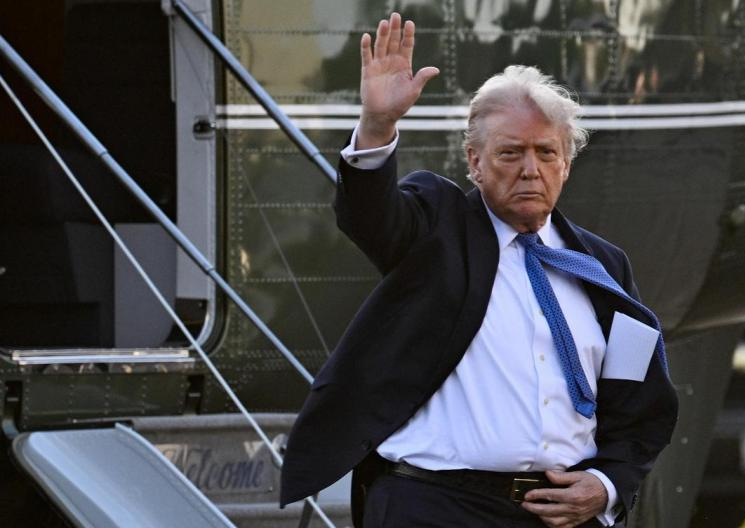
New financial reports released on Thursday (April 24th) show that global enterprises generally faced an uncertain business environment in the first quarter. Under the repeatedly changing trade stance of the Trump administration, business executives find it difficult to make effective decisions. As the earnings season enters its second week, enterprises have begun to clarify their new strategic directions and take measures to mitigate the impact of tariffs.
Andre Schulten, the chief financial officer of Procter & Gamble, pointed out in a conference call: "We must use all means to deal with the impact of tariffs on the cost structure and income statement." As the manufacturer of the Pampers brand, Procter & Gamble plans to raise prices to cover the new costs.
Several leading enterprises from the food, beverage and daily necessities industries have also expressed similar concerns. Businesses and investors generally believe that Trump's inconsistent attitude towards tariff policy and his public criticism of Federal Reserve Chair Powell are undermining market and consumer confidence.
PepsiCo, Procter & Gamble, American Airlines and Thermo Fisher Scientific have all lowered their full-year profit expectations. Among them, American Airlines announced the withdrawal of its 2025 financial forecast, echoing the recent moves of Delta and Southwest Airlines.
Jamie Caulfield, the chief financial officer of PepsiCo, said during the earnings call: "Compared with three months ago, our confidence in consumers has weakened significantly." Nestle's CEO Laurent Freixe, Unilever, and the Mexican restaurant chain Chipotle have also warned one after another that consumer confidence in the United States is declining.
Reuters statistics show that nearly 30 enterprises have cut or withdrawn their financial forecasts in the past two weeks, including building materials company Masco and several US airlines. Tesla CEO Elon Musk also said that the company will reevaluate its growth expectations within three months, partly due to unclear trade policies and sales resistance.
In early April, Trump announced at a high-profile ceremony the imposition of high tariffs on goods from many countries, causing significant market volatility and a decline in both business and consumer confidence. Although some tariffs were later withdrawn, Trump still threatened to impose a new round of tariffs on industries such as trucks, pharmaceuticals and semiconductors.
The White House claimed that negotiations with multiple countries demonstrated that the policy was effective. However, many enterprises pointed out that the repeated policies made it difficult for them to make plans for the next quarter.
Shulten pointed out: "We will not easily change the supply source or product formula without clear expectations. These decisions usually require months or even years of preparation. Temporary changes are not only costly but also difficult to reverse."
After a violent market reaction, Trump has postponed most tariffs until July 8th, but still maintains the general rate of 10%, as well as tariffs on imports of aluminium, steel and automobiles. Tariffs on Chinese goods are as high as 145%.
Reuters, citing sources, reported that the White House is considering lowering some tariffs on China in exchange for the resumption of negotiations between China and the United States. However, China insists that the United States completely lift tariffs first before being willing to resume consultations. Despite the recent easing of Trump's remarks, the US stock market rebounded this week and continued to rise on Thursday. However, the S&P 500 index still fell by 7.5% so far this year.
Facing an uncertain environment, Hyundai Motor of South Korea announced that it has established a special task force to deal with tariffs and has transferred the production capacity of some Tucson hybrid models from Mexico to the United States.
Hyundai said in a statement, "Under the influence of the intensification of the trade war and other uncontrollable factors, the operating environment is expected to remain severe." The company is still evaluating whether to switch some of the vehicles sold to the United States to be produced outside South Korea, while reiterating that the annual revenue target remains unchanged.
In the pharmaceutical sector, many enterprises are also preparing to expand their investment in the United States, despite concerns that the US Food and Drug Administration (FDA) might lay off staff due to fiscal cuts. David Elkins, the chief financial officer of Bristol Myers, said: "We are concerned about any policies that might hinder innovation or limit patients' access to drugs."
In China, e-commerce giant JD.com announced that it will establish a 200 billion yuan special fund to assist foreign trade enterprises in shifting to domestic sales. The company disclosed that since the announcement on April 11th, nearly 3,000 enterprises have submitted applications.

On January 4th local time, Trump warned India that if it does not limit its purchase of Russian oil, the United States will continue to raise tariffs on Indian products. Trump's latest warning sent shockwaves through the Indian financial market in just one day.
On January 4th local time, Trump warned India that if it do…
In October 2025, the US trade deficit narrowed unexpectedly…
According to the British media CoinJournal, recently, due t…
In January 2026, US President Trump once again set his sigh…
Europe is facing a crucial strategic choice: In the face of…
On New Year's Day 2026, BMW China announced a "systematic v…